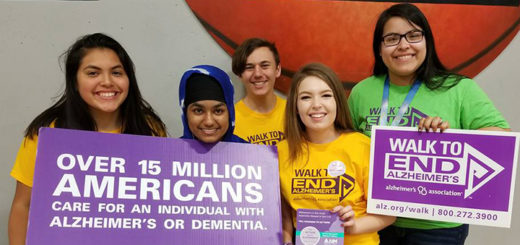Caregiver Corner: Long Distance Caregiving
 When you live many miles away from your loved one with Alzheimer’s, the separation can complicate caregiving. Concerns about the person’s safety, nutrition and health can be overwhelming at times. Following are some strategies to manage long-distance caregiving:
When you live many miles away from your loved one with Alzheimer’s, the separation can complicate caregiving. Concerns about the person’s safety, nutrition and health can be overwhelming at times. Following are some strategies to manage long-distance caregiving:
Establish support contacts
Building a list of contact people and resources can help you coordinate care from a distance. This support system may include:
- Family, friends and neighbors who can check in on your loved one or may be willing to stop by their home for regular visits.
- Your loved one’s doctor, who you will want to call you if there are concerns about the person’s mental or physical well being.
- Community organizations, including churches, temples, neighborhood groups and volunteer organizations. They may provide meal delivery, transportation or companion services.
- Aging agencies such as the local area agency on aging (AAA) has services that can help with meals, chores, and transportation.
- Home care services, which can be hired to help the person with bathing, personal care activities, preparing meals and taking medications.
- Geriatric care managers, which specialize in assessing and monitoring the needs of the elderly.
- Trusted professionals, such as bank officers who can help your loved one pay bills, or elder law attorneys who work with older clients and their families to get legal documents in place for making healthcare, legal and financial decisions.
- The Alzheimer’s Association, which can help you with decision-making and locate and arrange appropriate services for your loved one.
Make the most of visits
- Few long-distance caregivers are able to spend as much time with their loved one as they would like. The key is to use your time effectively:
- Make appointments with your loved one’s physician, lawyer and financial adviser during your visit to participate in any decision-making.
- Meet with neighbors, friends and other relatives to discuss how they think the person is doing. Ask if there have been any behavioral changes, health problems or safety issues.
- Take time to reconnect with your loved one by talking, listening to music, going for a walk or participating in activities you enjoy together.
If your loved one is still living in their home, also take the opportunity to observe:
- Is there food in the refrigerator? Is it spoiled? Is the person eating regular meals?
- What is the condition of the inside and the outside of the home? Has it changed?
- Are the bills paid? Are there piles of unopened mail?
- Do friends and relatives visit regularly?
- What is the person’s personal appearance? Are they bathing and grooming?
- Is the person still able to drive safely?
Resolving family conflicts
Caregiving issues can often ignite or magnify family conflicts, especially when people cope differently with caregiving responsibilities. Family members may deny what is happening, resent you for living far away or believe you are not helping enough. There may also be disagreement about financial and care decisions.
To reduce conflicts, acknowledge these feelings and work through them.
- Have a family meeting. Talking about caregiving roles and responsibilities, problems and feelings can help ease tensions. You may want help from a professional counselor or clergy.
- Recognize differences. Some family members may be hands-on caregivers, responding immediately to issues and organizing resources. Others may be more comfortable with being told to complete specific tasks.
- Share caregiving responsibilities. Make a list of tasks and include how much time, money and effort may be involved to complete them. Divide tasks according to the family member’s preferences and abilities.
- Continue to talk. Family meetings or conference calls keep the family up-to-date and involved. Discuss how things are working, reassess the needs of the person with Alzheimer’s, and decide if any changes in responsibilities are needed
If you are a long distance caregiver let us help you. Call us any time, day or night at 800.272.3900 or visit www.alz.org. You can also take part in the Alzheimer’s Associations online message boards located at www.alz.org/messageboards.

















